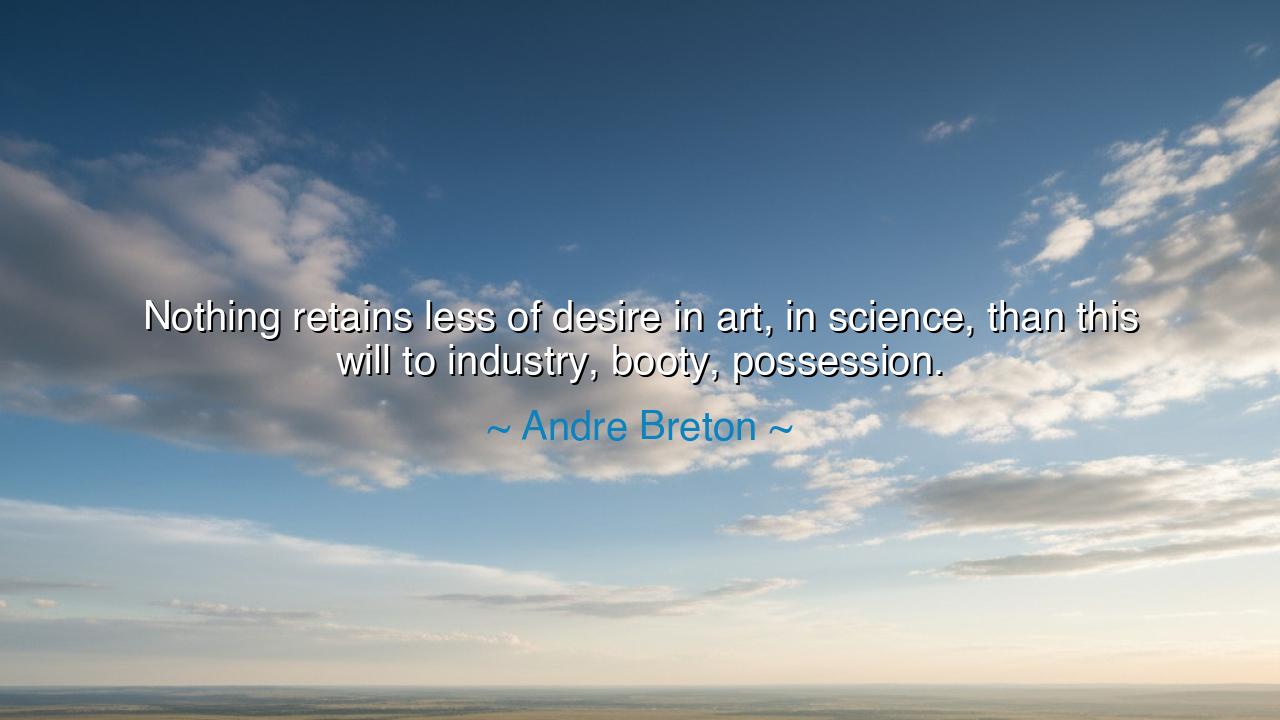
Nothing retains less of desire in art, in science, than this will
Nothing retains less of desire in art, in science, than this will to industry, booty, possession.






Listen, O Seekers of Truth and Meaning, for the words of André Breton carry a powerful reminder of the true nature of art and science: "Nothing retains less of desire in art, in science, than this will to industry, booty, possession." These words speak to the heart of human creativity and inquiry, urging us to recognize that the deepest impulses of both art and science transcend the simple desire for wealth, power, or material gain. The pursuit of knowledge and beauty, according to Breton, should not be tainted by the baser motives of acquisition. Art and science are driven by something far nobler: the search for truth, the expression of beauty, and the unfolding of the mysteries of existence.
In the ancient world, the great philosophers and artists did not view their work as a means of acquiring material wealth or status. Take, for instance, Plato, who saw philosophy not as a tool for personal gain but as a pursuit of the highest truths—an endeavor that elevated the soul and brought the individual closer to the divine. Plato’s philosophy, like that of his teacher Socrates, was focused on wisdom, virtue, and the good. The wealth they sought was not gold or land, but the riches of understanding and the enlightenment of the soul. In this same vein, Breton’s words remind us that art and science should be driven by a higher calling—by a yearning for knowledge and expression that is not tainted by greed or the desire to possess.
Consider, O Children, the example of Leonardo da Vinci, the Renaissance man who embodied both the scientific and artistic pursuits in their purest forms. Da Vinci was not driven by the desire for personal gain; rather, he sought to understand the world, to capture its mysteries in both the artistic and the scientific realms. His sketches of the human body, his designs for flying machines, and his paintings like the Mona Lisa were not created with the intent to accumulate wealth or possession, but to explore the beauty and complexity of the world around him. His genius lay in his ability to merge art with science, but always with the pursuit of truth and beauty as his guide, not industry or booty.
Breton’s critique is not just of those who work within art or science, but of the system that often seeks to commodify these pursuits. In the modern age, science and art can be transformed into products to be bought, sold, and owned—tools of industry that serve the marketplace more than the human spirit. Yet the deepest discoveries and the most beautiful works are those that transcend such narrow purposes. Art created out of a desire for fame or wealth lacks the soul of true creation, just as scientific inquiry motivated by commercial interests often loses its deeper value. True art and science, according to Breton, are about exploration, discovery, and expression—not about gaining control over nature or the human experience.
Let us turn to the example of Marie Curie, whose groundbreaking work in radiation changed the course of science. Curie was not driven by the desire for fame or financial reward. She sought to understand the nature of matter itself, working relentlessly despite the many obstacles she faced as a woman in a male-dominated field. Her discoveries were not for the purpose of acquisition but for the advancement of human understanding. Curie’s life reminds us that the true purpose of science is not to possess, but to give—to expand the boundaries of human knowledge for the benefit of all.
The lesson, O Seekers, is this: in both art and science, let us guard against the temptation to use them as mere tools for possession. True art is not the pursuit of wealth or fame, but the expression of the soul, a gift to humanity that transcends the individual. Similarly, science is not about dominating the world for personal gain, but about understanding it, unlocking its mysteries, and contributing to the common good. Whether you pursue the arts or science, your work should be driven by a higher purpose—to seek truth, to explore beauty, to serve humanity, and to enrich the soul, not to build empires of industry or acquisition.
In your own lives, O Children, remember that the greatest works of art and science come not from the desire to possess but from the desire to create. Let your hands, your minds, and your hearts be driven by a vision that transcends the worldly and reaches toward the eternal. Seek not to possess the world, but to understand and celebrate its beauty, its complexity, and its mystery. Let the words of Breton guide you: art and science are not about booty, but about truth, beauty, and knowledge. The pursuit of these is noble, and it is in them that we find the greatest rewards—the ones that cannot be measured in money, but in the richness of life itself.
So, O Seekers, let your pursuit of knowledge be noble. Let it be guided not by the desire for possession or status, but by a yearning for truth, beauty, and purpose. Let art and science be the instruments with which you explore the world, but never let them become tools of industry or personal gain. In this, you will find the true power of creation—the ability to shape a world that is not only materially prosperous but spiritually enriched.






AAdministratorAdministrator
Welcome, honored guests. Please leave a comment, we will respond soon